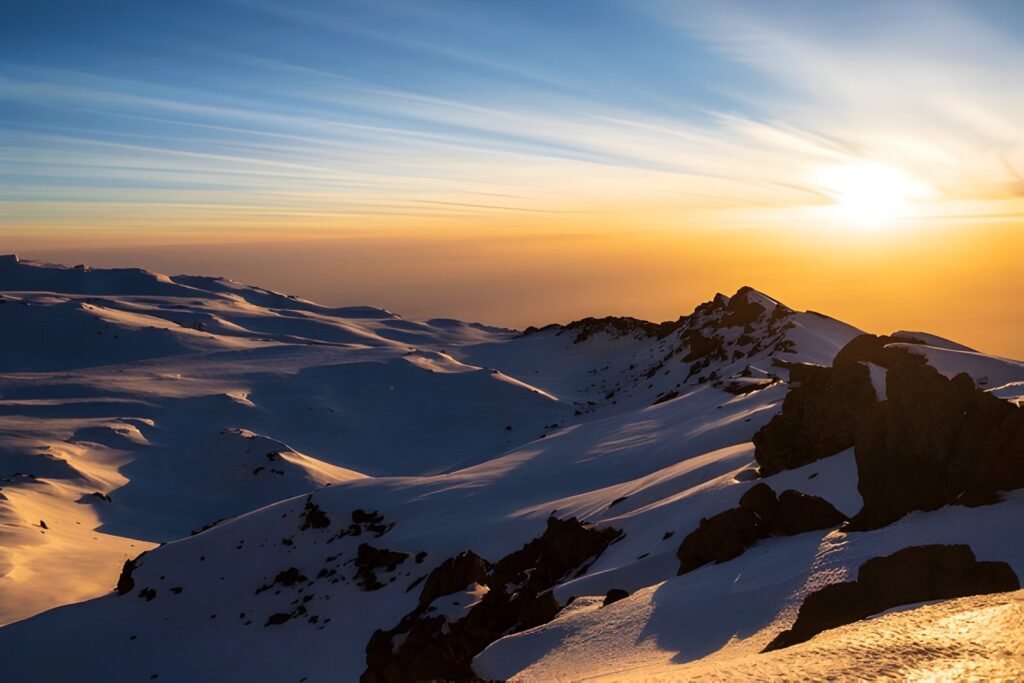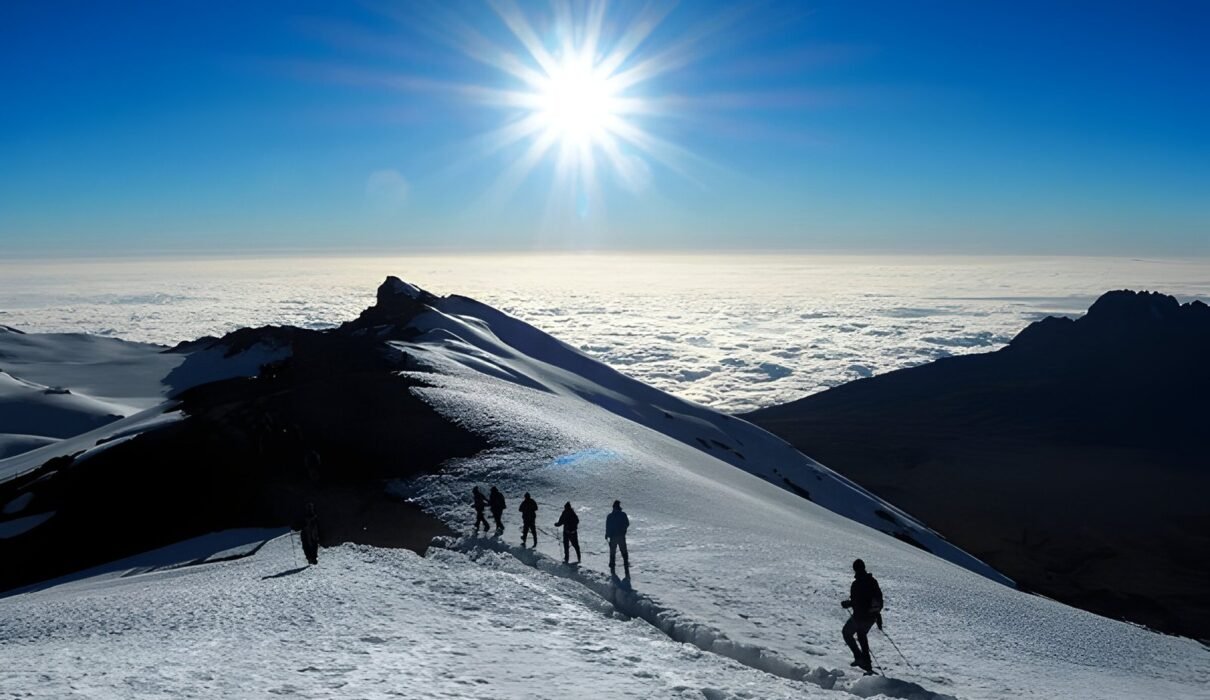Mountain climbing is an exciting adventure, offering breathtaking views and a sense of accomplishment. However, it’s important to be prepared, especially if you’re new to climbing. Whether you’re planning to conquer a small peak or dream of scaling taller mountains like Kilimanjaro, these essential beginner tips will help ensure a successful and safe climb.
Start your mountain climbing journey with expert guidance.

1. Start with Basic Fitness Training
Mountain climbing requires a solid foundation of physical fitness. You don’t need to be an athlete, but you should be in good shape to handle long hikes and steep inclines. Begin by focusing on cardio exercises such as running, cycling, or hiking. Strength training for your legs, core, and back is also important to help you manage the demands of the climb.
Training Tips:
- Cardio: Engage in regular running, swimming, or hiking to build endurance.
- Strength: Incorporate squats, lunges, and step-ups to strengthen your legs.
- Stamina: Increase your training intensity as your climb date approaches.
Learn more about fitness preparation for mountain climbing.
2. Research Your Climb and Choose the Right Mountain
Not all mountains are created equal. If you’re a beginner, start with a smaller, less technical climb. Research different mountains to understand the difficulty level, terrain, and altitude. Popular beginner-friendly climbs include Mount Fuji in Japan and Mount Kilimanjaro in Tanzania.
Choosing the Right Mountain:
- Beginner-Friendly Peaks: Look for routes that are non-technical and suitable for first-time climbers.
- Altitude Consideration: Be aware of how altitude might affect you, and consider a mountain that offers gradual acclimatization.
Find the best beginner mountains to climb.
3. Acclimatize to Avoid Altitude Sickness
Altitude sickness is a common issue for climbers, even at moderate elevations. Symptoms include headaches, dizziness, and fatigue. It’s crucial to allow your body time to adjust to the reduced oxygen levels as you ascend.
Acclimatization Tips:
- Climb Slowly: Take your time and ascend at a steady pace.
- Hydrate: Drink plenty of water to stay hydrated and reduce the risk of altitude sickness.
- Rest Days: On multi-day climbs, plan for rest days to help your body adjust.
Read more about how to prevent altitude sickness.
4. Invest in Proper Gear and Clothing
Having the right gear is essential for a successful climb. Invest in quality hiking boots that provide ankle support and have been properly broken in. Additionally, wear moisture-wicking base layers, insulating mid-layers, and a waterproof jacket to keep you comfortable in varying weather conditions.
Gear Essentials:
- Hiking Boots: Sturdy, waterproof boots with good grip are a must.
- Clothing Layers: Use a layering system to stay warm and dry in changing conditions.
- Backpack: Choose a comfortable pack with enough room for water, snacks, and essential gear.
Check out the complete mountain climbing gear list.
5. Learn Basic Navigation and Survival Skills
While many climbing routes are well-marked, it’s important to know how to navigate using a map and compass in case you lose your way. Additionally, basic survival skills, such as setting up camp, starting a fire, and purifying water, are useful in case of emergencies.
Navigation Tips:
- Maps & GPS: Always carry a physical map, a compass, and a GPS device.
- First Aid: Learn basic first aid skills to treat minor injuries during the climb.
Explore essential navigation and survival skills for climbers.
6. Hydration and Nutrition Are Key
Staying hydrated and fueled is crucial for maintaining your energy levels during a climb. Dehydration can lead to fatigue and altitude sickness, so it’s important to drink water regularly. Pack high-energy snacks like nuts, energy bars, and dried fruit to keep you going.
Nutrition Tips:
- Water: Bring a hydration bladder or multiple water bottles, and drink regularly.
- Snacks: Pack lightweight, energy-dense snacks for the climb.
- Meals: For multi-day climbs, plan meals that are easy to prepare and nutritious.
Learn more about what to eat and drink during a mountain climb.
7. Know the Weather Conditions
Weather can change rapidly in the mountains, so it’s important to be prepared. Check the weather forecast before you set out, and keep an eye on changing conditions during the climb. Bring rain gear and extra layers, even if the forecast looks clear.
Weather Safety Tips:
- Monitor Conditions: Use reliable apps or websites to track mountain weather.
- Be Prepared: Always carry extra layers and waterproof gear in case of sudden weather changes.
Check out real-time weather updates for mountain climbers.
8. Hire a Guide for Your First Climb
If you’re climbing a mountain for the first time, consider hiring an experienced guide. A guide can help you navigate the route, provide important safety tips, and offer encouragement when the climb gets tough.
Benefits of Hiring a Guide:
- Expertise: A guide knows the terrain, local weather patterns, and the best paths to take.
- Safety: Having a guide reduces the risk of getting lost or encountering dangerous situations.
Find expert mountain climbing guides for your first climb.
9. Practice Mental Toughness
Mountain climbing can be mentally demanding, especially when the trail gets steep, or the weather turns unfavorable. Prepare yourself for the mental challenges by practicing mindfulness, deep breathing, and positive thinking. Breaking the climb into smaller sections can make the challenge seem less overwhelming.
Mental Preparation:
- Set Small Goals: Focus on reaching one point at a time rather than thinking about the summit.
- Stay Positive: Keep a positive mindset and remind yourself of why you wanted to climb.
Read more about mental toughness for mountain climbers.
10. Respect the Environment
Mountain ecosystems are fragile, and it’s important to practice Leave No Trace principles to minimize your impact on the environment. Always carry out your trash, avoid disturbing wildlife, and stick to established trails to preserve the natural beauty for future climbers.
Leave No Trace Tips:
- Pack It Out: Bring a bag to carry your trash and avoid littering.
- Stay on Trails: Avoid creating new paths that can damage vegetation and lead to erosion.
- Respect Wildlife: Observe animals from a distance and avoid feeding them.
Learn more about how to leave no trace while climbing.
Conclusion: Prepare for a Rewarding Climb
Climbing a mountain for the first time is an exhilarating experience, but preparation is key to ensuring a safe and enjoyable adventure. By focusing on physical fitness, packing the right gear, and staying mentally tough, you can make your first mountain climb a rewarding and unforgettable journey. Whether you’re tackling a local peak or preparing for a climb up Mount Kilimanjaro, following these beginner tips will help you reach the summit with confidence.
For personalized climbing packages and expert advice, visit Kilimanjaro Climb Specialist or Eddy Tours & Safaris.

